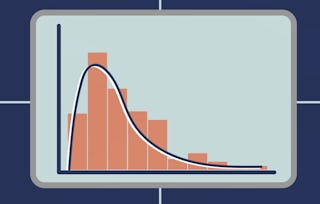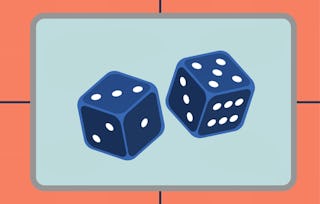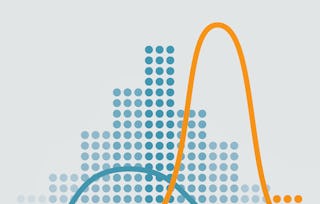This is the capstone project for UC Santa Cruz's Bayesian Statistics Specialization. It is an opportunity for you to demonstrate a wide range of skills and knowledge in Bayesian statistics and to apply what you know to real-world data. You will review essential concepts in Bayesian statistics with lecture videos and quizzes, and you will perform a complex data analysis and compose a report on your methods and results.

Gain next-level skills with Coursera Plus for $199 (regularly $399). Save now.

Bayesian Statistics: Capstone Project
This course is part of Bayesian Statistics Specialization

Instructor: Jizhou Kang
Included with
Recommended experience
What you'll learn
Demonstrate a wide range of skills and knowledge in Bayesian statistics.
Explain essential concepts in Bayesian statistics.
Apply what you know to real-world data.
Skills you'll gain
Details to know

Add to your LinkedIn profile
See how employees at top companies are mastering in-demand skills

Build your subject-matter expertise
- Learn new concepts from industry experts
- Gain a foundational understanding of a subject or tool
- Develop job-relevant skills with hands-on projects
- Earn a shareable career certificate

There are 4 modules in this course
In this module, we will introduce conjugate Bayesian analysis for the autoregressive (AR) models.
What's included
3 videos7 readings2 assignments
In this module, we will introduce some criteria that can be used in selecting the order of AR processes and the number of mixing components, which will be used later when we introduce mixture of AR models.
What's included
2 videos2 readings2 assignments
In this module, we will perform Bayesian analysis for location mixture of AR(p) models.
What's included
4 videos3 readings2 assignments
In this module, we will use everything we have learned up until now to perform a mixture model on time series data.
What's included
1 reading1 peer review
Earn a career certificate
Add this credential to your LinkedIn profile, resume, or CV. Share it on social media and in your performance review.
Instructor

Offered by
Explore more from Data Analysis
 Status: Free Trial
Status: Free TrialUniversity of California, Santa Cruz
 Status: Free Trial
Status: Free TrialUniversity of California, Santa Cruz
 Status: Free Trial
Status: Free TrialUniversity of California, Santa Cruz

Duke University
Why people choose Coursera for their career





Open new doors with Coursera Plus
Unlimited access to 10,000+ world-class courses, hands-on projects, and job-ready certificate programs - all included in your subscription
Advance your career with an online degree
Earn a degree from world-class universities - 100% online
Join over 3,400 global companies that choose Coursera for Business
Upskill your employees to excel in the digital economy
Frequently asked questions
To access the course materials, assignments and to earn a Certificate, you will need to purchase the Certificate experience when you enroll in a course. You can try a Free Trial instead, or apply for Financial Aid. The course may offer 'Full Course, No Certificate' instead. This option lets you see all course materials, submit required assessments, and get a final grade. This also means that you will not be able to purchase a Certificate experience.
When you enroll in the course, you get access to all of the courses in the Specialization, and you earn a certificate when you complete the work. Your electronic Certificate will be added to your Accomplishments page - from there, you can print your Certificate or add it to your LinkedIn profile.
Yes. In select learning programs, you can apply for financial aid or a scholarship if you can’t afford the enrollment fee. If fin aid or scholarship is available for your learning program selection, you’ll find a link to apply on the description page.
More questions
Financial aid available,
¹ Some assignments in this course are AI-graded. For these assignments, your data will be used in accordance with Coursera's Privacy Notice.

